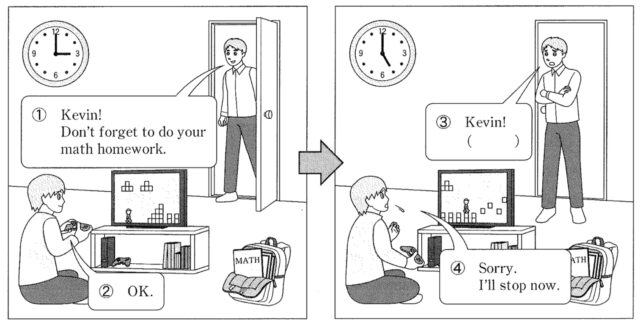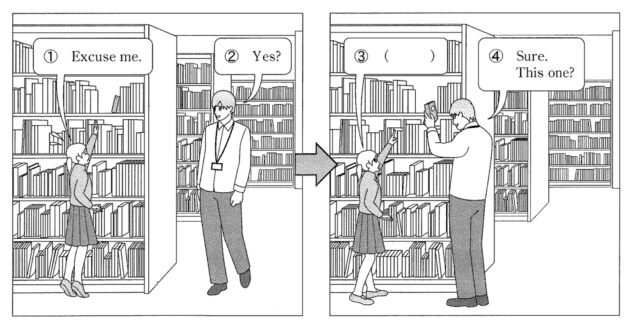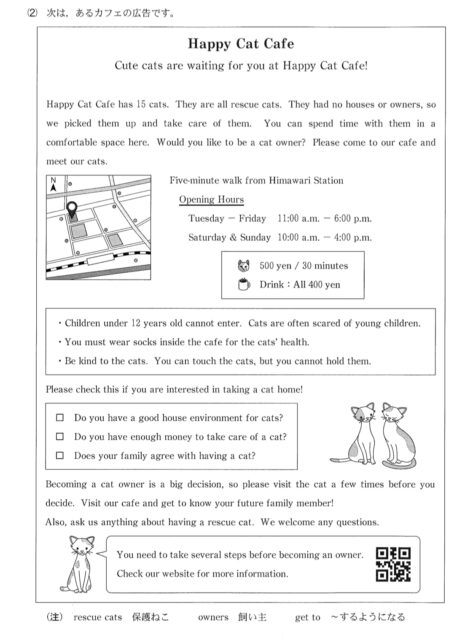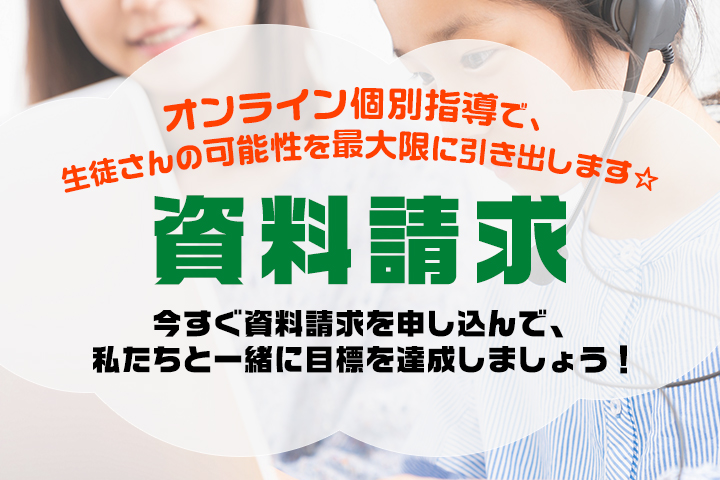■問題PDF
令和7年度_学力検査問題過去問【千葉】- 英語
■目次
大問1
大問2
大問3
大問4
大問5
大問6
大問7
大問8
大問9
■大問1
1から4の四つです。
1は、英語の対話を聞いて、最後の文に対する受け答えを選ぶ問題です。受け答えとして最も適当なものを、それぞれ問題用紙のAからDのうちから一つずつ選んで、その符号を答えなさい。
なお、対話はそれぞれ2回放送します。では、始めます。
No,1
Woman: This bag is too heavy.
Man: Are you all right?
Woman: No. Please help me.
A. Yes, please.
C. That’s right.
B. Sure.
D. Good job.
解答 : B
No,2
Boy: What did you do last weekend?
Girl: I visited my grandparents.
Boy: That sounds nice. What did you do with them?
A. It took four hours.
C. I went there with my parents.
B. They had a big garden.
D. We cooked together and ate a lot.
解答 : D
No,3
BWoman: What are you reading?
Boy: I’m reading a book about science.
Woman: Is it for your class?
A. Yes, it’s on the table.
C. No, you’re not in my class.
B. Yes, I will write it.
D. No, it’s just for fun.
解答 : D
■大問2
2は、英語の対話又は英語の文章を聞いて、それぞれの内容についての質問に答える問題です。 質問の答えとして最も適当なものを、それぞれ問題用紙のAからDのうちから一つずつ選んで、 その符号を答えなさい。なお、英文と質問はそれぞれ2回放送します。では、始めます
No,1

Woman: Hello?
Man: Hello, this is ABC Pizza House. Is this Ms. Harrison?
Woman: Yes, it is.
Man: I’m near your house, but I can’t find it.
Woman: My house is the one with a bicycle in front of it.
Man: I see a few houses with bicycles. What else can I look for?
Woman: There are flowers on the right side of the door.
Man: Great, I found it! I’ll be there soon.
Question: Which is Ms. Harrison’s house?
解答 : D
No,2

Hi, I’m Amy. This picture was taken after my dance team won the contest last year. Everyone looks very happy.
The person in the middle is me. The tallest one is my sister, Lisa. The person next to her is Sarah. She moved to Canada last summer. I hope she’s doing well now.
Question: Which is Sarah?
解答 : C
■大問3
3は、英語の対話又は英語の文章を聞いて、それぞれの内容についての質問に答える問題です。
質問の答えとして最も適当なものを、それぞれ問題用紙のAからDのうちから一つずつ選んで、その符号を答えなさい。なお、英文と質問はそれぞれ2回放送します。では、始めます。
No,1
Father: Let’s clean the living room together.
I’ll move the table first. Can you clean
the floor? I’ll wash the curtains.
Emma: It’s nice weather for cleaning!
Can you help me, Emma?
Father: Yes, Dad. What should I start with?
Emma: OK.
Do we need to clean the windows, too?
Father: Yes. But let’s do it after we finish everything else.
Emma: OK.
Question: What will Emma do first?
A. Move the table.
C. Wash the curtains.
B. Clean the floor.
D. Clean the windows.
c
No,2
Do you want to communicate in English?
If you do, please join us! We are a volunteer
group holding one-day trips for foreign tourists.
We need new members who can speak
English! We walk around the town with tourists and show them some interesting places.
If you are interested in our group, please visit our website!
Question: Who is this group looking for?
A. Tourists from other countries.
C. People who can speak English.
B. Students who want to go abroad.
D. Someone who can make a website.
解答 : C
■大問4
4は、英語の対話を聞いて、その内容について答える問題です。問題用紙には、対話の内容に関するメモが書かれています。>
メモを完成するために、①、②に入る最も適当なものを、それぞれ問題用紙のAからDのうちから一つずつ選んで、その符号を答えなさい。なお、英文は2回放送します。では、始めます。
Misa: Let’s talk about how to improve our basketball team. Can you tell us your idea first, Ryan?
Ryan: OK, Misa. I think we should watch some online videos together, and talk about how to play better. I think talking and thinking together is as important as practicing. What do you think, Misa?
Misa: I like that idea, Ryan, but I think we should go to a training camp. We can spend a lot of time together and understand each other better. I think better friendships help us to make our team stronger.
①

A. Watching a game together
C. Practicing together
B. Learning about online videos
D. Talking and thinking together
解答 : D
②

A. Becoming better friends
C. Having dinner together
B. Spending a lot of time for practice
D. Learning about better training
解答 : A
■大問5
5 次の(1)~(5)の対話文を完成させなさい。
(1) (2)については、それぞれの( )の中の語を最も適当な形にしなさい。ただし、英単語1語で答えること。
また、(3)~(5)については、それぞれの( )の中のア~オを正しい語順に並べかえ、その順序を符号で示しなさい。
(1)
A: Look at (that) people in the park. What are they doing?
B: I think they are practicing dancing for the festival.
解答 : those
解説 : people は複数形なので、that ではなく those を使います
(2)
A: Do you want to try wearing a kimono?
B: Yes! I have never (wear) one before.
解答 : worn
解説 : have never + 過去分詞の形なので、wear の過去分詞 worn を使います
(3)
A: How many books do you read each month?
B: Only one or two. I (ア had イ I ウ time エ more オ wish) to read.
解答 : オイアエウ
解説 : 仮定法の構文 (I wish+仮定法過去) です
(4)
A: I think (ア sports イ soccer ウ team エ are オ such as) good for children.
B: I agree, but I think other kinds of sports are also good for them.
解答 : ウアオイエ
解説 : sports such as soccer team は「サッカーのようなスポーツは~」という意味です
(5)
A: It’s hot in this room. Can I turn on the air conditioner?
B: Sure. You should close (ア keep イ the door ウ the room エ cool オ to).
解答 : イオアウエ
解説 : to keep the room cool(部屋を涼しく保つために)という目的を表す不定詞句になります
■大問6
次の(1)、(2)のイラストについて、( )に入る適当な言葉をそれぞれ英語で書きなさい。ただし、語数はそれぞれ10語程度(..?!などの符号は語数に含まない。)とし、2文以内で書きなさい。なお、会話は①~④の順に行われています
(1)

ケビン (Kevin)と父親の会話です
解答 : You’re still playing games! Stop and do your homework now.
解説 : ①で父親に数学の宿題をすることを忘れないようにと言われているが、2枚目の写真でもまだゲームを続けているので、「ゲームをやめて、宿題をやりなさい」となるように書くのが自然です。
(2)

図書館での会話です
解答 : Can you get that small book for me, please?
解説 : 1枚目の写真で女の子が男性に「すみません」と声をかけて、2枚目の男性は本を手に取りながら「もちろん、これでいい?」と返答しています。よって③には「本を取ってくれませんか?」という問いが入るのが自然です。 Can you 〜:〜してくれませんか?
■大問7
次の(1),(2)の英文を読んで、それぞれの問いに答えなさい。
(1)
ユカ (Yuka)たちのグループは、英語の授業で、自分たちが考えた理想のアプリ (our ideal app)について、スライドを使いながら発表をしています。
< Yuka >
If you could create an app, what would it be like? We designed our ideal app which can make people happy. First, Kent will tell you how we designed the app, then, Maki and I will talk about what it does.
< Kent>
First, we asked our family, friends and teachers what kind of apps they wanted. We got a lot of interesting ideas. We found that about 30% of them wanted apps for housework like cooking and cleaning, 20% wanted apps for health, 15% wanted apps that help them save energy, water, or food, and 10% wanted apps for studying. Second, we talked about what our app would be for. Maki and I thought it should be for family life, and Yuka wanted to make something good for the environment. So, we decided to design an app which can improve both family life and the environment.
< Maki>
I will explain what we can do with our app. It’s called “What’s for Dinner?” It recommends the best dinner for a family. By connecting our app with your refrigerator and each family member’s smartphone, it can check the food in the refrigerator and each family member’s health, and then it will decide the best menu for dinner and choose a recipe to use. If you send photos of your lunch to our app, it will give you a different menu for dinner. You can enjoy a good dinner with your family by using this app.
< Yuka >
Our app is good for the environment, too. It helps you save electricity. Also, it can help you reduce food waste.
We believe our app can make you happier because you can enjoy a good dinner and protect the environment. We hope that someone will make this idea a reality in the near future. Thank you for listening. Do you have any questions?
①

ユカたちのグループは、発表で次のア~エのスライドを使いました。これらのスライドを発表で使用した順に並べかえ、その順序を符号で示しなさい。
解答 : エイウア
解説 :
Kent が最初に家族・友達・先生に聞いた内容をパーセントで発表しているのでエ
Maki がアプリの名前 ‘What’s for Dinner?’ を紹介しているのでイ
その後の2行目からアプリの機能(冷蔵庫・スマホと連携し、健康状態をもとにレシピを提案) を紹介しているのでウ
Yuka が最後に「環境にも良い」と発表しているので ア
②
本文の内容に関する次の質問の答えとして適当でないものを、あとのア〜エのうちから一つ選び、その符号を答えなさい。
What does their app do?
ア It collects information about family members.
イ It gives advice about health to each family member.
ウ It shows how to cook the dishes it recommends.
エ It helps to reduce the amount of food thrown away.
解答 : イ
解説 :
ア正しい。スマートフォンを通じて家族の健康情報を取得しています。
イ誤り。健康状態を「チェック」することは書かれていますが、「アドバイスを与える」とは書かれていません。
ウ正しい。「レシピを選ぶ」とあるので、作り方を提示していると考えられます。
エ正しい。Yukaが「フードロス削減に役立つ」と発表しています。
③
発表を開いたフレッド (Fred) がユカに質問をしています。次の会話中の( )に入る最も適当な英単語1語を書きなさい。
Fred: Your presentation was interesting, but I have a question, Yuka. You said that you can save electricity by using the app. How?
Yuka: Thank you, Fred. That’s a good question. Our app can tell you what is in your refrigerator. You don’t have to ( ) it to check, so the cold air won’t go out and you can save electricity.
Fred: Oh, I see. Thank you.
解答 : open
解説 : 「それ(冷蔵庫)を開ける必要がない」なのでopenが正解です。
④
本文の内容に合っている英文として最も適当なものを、次のア〜エのうちから一つ選び、その符号を答えなさい。
ア They did research before they started to design their app.
イ They designed an app to improve their school environment.
ウ The app they designed sends you photos of the food in your refrigerator.
エ The app they designed checks how much electricity is saved.
解答 : ア
解説 :
ア 正しい。家族、友達、先生にどんなアプリが欲しいか聞いています。
イ 誤り。「家庭生活と環境改善」が目的で、学校環境は関係ありません。
ウ 誤り。「昼ご飯の写真を送る」のはユーザーで、アプリが送るわけではないです。
エ 誤り。アプリは電気の節約を助けますが、量を「チェックする」とは書かれていません。
(2)

次は、あるカフェの広告です。
①
広告の内容に合うように、次の英文の( )に入る最も適当なものをあとのア〜エのうちから一つ選び、その符号を答えなさい。
You cannot enter this cafe ( ).
ア if you don’t want to become an owner of a cat
イ if you haven’t checked their website
ウ if your child is 14 years old
エ if you don’t wear socks
解答 : エ
解説 : 広告には「靴下を履いていないと入れない」と書いてあるのでエが正解です。
②
広告を見て、ニコ(Nico)とエミ (Emi)が話をしています。次の会話中の( )に入る最も適当なものを、あとのア~エのうちから一つ選び、その符号を答えなさい
Nico: I visited this cafe with my parents last week.
Emi: Oh, how was it?
Nico: All the cats were really cute, and I found my favorite one.
Emi: Did you take it home?
Nico: No. The cafe recommends that we should ( ), so we’re going to visit the cafe again. We need to take several steps before becoming an owner.
Emi: I see.
ア pay enough money for the cat
イ learn how they picked up rescue cats
ウ get to know the cat better
エ make friends with other cat owners
解答 : ウ
解説 : カフェのポリシーとして「猫と十分に知り合ってから迎えることを勧めている」とあるので、ウが正解です。
get to know 〜:〜のことを知るようになる
③
広告の内容に合っている英文として最も適当なものを、次のア~エのうちから一つ選び、その符号を答えなさい。
ア Small children cannot enter this cafe because they are afraid of cats.
イ This cafe is open for longer hours on weekends than on the other days.
ウ This cafe has fifteen rescue cats and they all live outside.
エ Customers must not hold the cats but they can touch them.
解答 : エ
解説 :
ア 誤り。「小さな子どもは猫を怖がるから入れない」とは書かれていません(年齢制限はあるが理由が違う)
イ 誤り。「週末の方が営業時間が長い」とは書かれていません。
ウ 誤り。「15匹の保護猫がいる」とは書かれていますが、「すべて外で暮らしている」とは書かれていません。
エ 正しい。広告には『抱っこは禁止だが、触れるのはOK』と書かれています。
■大問8
次のサトミ (Satomi)のスピーチを読んで、あとの(1)~(5)の問いに答えなさい。
Albert Einstein once wrote, “Life is like riding a bicycle. To keep your balance, you must keep moving.” I am often encouraged by his words when I have a problem. I always try to keep moving forward. However, one time, ( A ).
Last summer, I visited New Zealand and stayed with a host family for three weeks. At first, I wasn’t worried about staying there because I liked studying English and I believed I was good at it. But I could not communicate well with people there. I was shocked and felt very sad.
I lost my energy and I didn’t want to do anything. I felt I couldn’t achieve anything in my life. A week after I arrived, my host grandmother, Karen, talked to me with a smile. She said, “Satomi, do you have ikigai?” I was surprised to hear a Japanese word from her. I asked her why she knew the word. She said, “A few years ago, when I became sick and very depressed, one of my friends told me about the idea of ikigai. Then I learned more about it from some books. It helped me a lot to move forward.” She also said, “Why don’t you ask other people about their ikigai? You can ask, ‘What is your purpose in life? or ‘What do you love to do? or (B) I know you can do it.”
During my stay, I asked many people these questions. People looked happy when they were talking about their ikigai, and I felt happy, too. At the same time, found my English was improving. I thought that communicating with people and looking at people’s happy smiles could be one of my ikigai. I found that my ikigai is related to other people’s happiness, too.
After I came back to Japan, I read more about ikigai on the Internet. People around the world are getting to know the word because of some research that was done. Some researchers believe that having an ikigai makes life more exciting. They also believe people who have one are healthier and live longer.
According to a dictionary, the word ikigai means “something that makes you happy to be alive.” However, in my opinion, the word has more meanings and it is difficult to explain in other words. So the Japanese word ikigai is used in other languages, too. For me, ikigai is something that helps me keep moving forward. Life is like riding a bicycle, so let’s find our own ikigai and keep moving forward.
(1)
本文中の(A)に入る最も適当なものを、次のア~エのうちから一つ選び、その符号を答えなさい。
ア I suddenly forgot how to keep moving
ウ someone broke my favorite bicycle.
イ someone taught me how to ride a bicycle
エ I didn’t have any problems
解答 : ア
解説 : 直前に「私はいつも前に進もうとしている」と述べており、「しかしあるとき…」という逆接の後に来る内容として、「前に進めなくなった」が正解です。
(2)
本文中の(B)に入る英文として適当でないものを、次のア~エのうちから一つ選び、その符号を答えなさい。
ア What are you good at?
イ What do you enjoy doing?
ウ What can society do for you?
エ What can you do for others?
解答 : ウ
解説 : 「社会が自分に何をしてくれるか」という受動的な問いなので、文脈に合いません。Karenの発言は「あなたの生きがい(ikigai)について自分で問いかける」内容なのでウの選択肢は誤りです。
(3)
サトミのスピーチを聞いたハル (Haru)とビリー (Billie)が話をしています。次の会話中の( )に入る適当な言葉を英語で書き、英文を完成させなさい。ただし、語数は6~10語( などの符号は語数に含まない。)とすること。
Haru: I thought ikigai was just something that a person likes doing, but Satomi’s speech changed my idea of ikigai.
Billie: How was it changed?
Haru: From Satomi’s speech, I learned that ikigai is also something that ( ).
Billie: I understand. We feel happy when we make other people happy. I think we all want to feel useful.
解答 : is related to other people’s happiness
解説 : Satomi はスピーチ中の中で「私の ikigai は他人の幸福に関係している」と発言しています。これを受けての Haru の発言は「他人の幸福に関係している」とするのが自然です。
be related to 〜:〜に関連している
(4)
本文の内容に合うように、次の英文の( )に入る最も適当なものを、あとのア〜エのうちから一つ選び、その符号を答えなさい。
Satomi thinks that the Japanese word ikigai is used around the world because ( ).
ア everyone likes to hear the word
イ some researchers spread the word
ウ many people are studying Japanese
エ the word is difficult to translate
解答 : エ
解説 : 5段落目に “the word has more meanings and it is difficult to explain in other words.” とあり、「「説明が難しいから、他の言語でもそのまま使われている」と書かれています。よってエが正解です。
(5)
本文の内容に合っている英文として最も適当なものを、次のア~エのうちから一つ選び、その符号を答えなさい。
ア Satomi felt sad because people didn’t like to communicate with her.
イ Karen wanted to encourage Satomi by talking in Japanese.
ウ Satomi read some articles about ikigai while she was in New Zealand.
エ Some researchers think ikigai helps people to live longer.
解答 : エ
解説 :
ア 誤り。Satomi が悲しかったのは「英語が通じず自信を失った」ためで、他人に拒絶されたからではないです。
イ 誤り。Karen は自分の経験から ikigai を伝えたかったのであって、単に日本語で話したかったわけではないです。
ウ 誤り。Satomi が ikigai について本で読んだのは帰国後です。
エ 正しい。5段落目最後の2文で、研究者の一部は ikigai が寿命に良い影響を与えると考えているとあります。
■大問9
中学生のナミ (Nami)が料理人のジョン (John)にインタビューをしています。この対話文を読んで、 (1) 〜 (4) に入る最も適当なものを、それぞれあとのア〜エのうちから一つずつ選び、その符号を答えなさい。
Nami: Today, I’d like to interview you for my presentation.
John: OK, Nami. Please ask me anything.
Nami: Thank you. First, why did you come to Japan? Did you come to Japan (1) ?
John: No, not at all. I first came to Japan fifteen years ago as an exchange student. While I was studying at a university in Tokyo, I fell in love with Japanese cuisine. After the first year of my exchange program, I left the university and entered a Japanese cooking school.
Nami: That’s interesting. When did you open your own restaurant?
John: About two years ago.
Nami: You mean (2) ?
John: Well, I had to learn many things, so it took a long time. After I graduated from the cooking school, I started working at a restaurant and I learned more. I needed to learn Japanese language and culture, too.
Nami: I see. (3)
John: I wanted to keep living here and learning more about Japan.
Nami: Lastly, (4)
John: Yes. I would like to open a second restaurant in my country in 10 years.
Nami: Wow! That would be great.
(1)
ア to study in Tokyo
ウ fifteen years ago
イ as an exchange student
エ to become a chef
解答 : エ
解説 : Namiが「日本に来た理由」を聞いて、John は「料理人になるために来たのではない」と否定しています。よって、選択肢のエ「to become a chef(料理人になるために)」が最も自然で、それを否定しています。
(2)
ア you didn’t want to go back to your country
イ it took more than ten years to become a chef
ウ you had to study Japanese culture
エ there were not any chefs who came from other countries
解答 : イ
解説 : John の返答が「多くのことを学ぶ必要があったので、長い時間がかかった」と続くので、ナミの質問は「10年以上かかったということですか?」という内容が自然です。
(3)
ア Why did you open a restaurant in Japan, not in your country?
イ What did you want to learn in Japan?
ウ What was the hardest thing when you opened your restaurant?
エ Why did you decide to learn more at a restaurant?
解答 : ア
解説 : John の返答は「ここに住み続けて、日本についてもっと学びたかった」なので、それに対応するナミの質問は「なぜ自分の国ではなく、日本にレストランを開いたのか?」が自然です。
(4)
ア would you like to live in another country
イ do you have any dreams now
ウ is your restaurant open today
エ have you opened another restaurant
解答 : ア
解説 : John が「10年後に自分の国に2号店を開きたい」と答えているため、ナミの質問は「今、何か夢はありますか?」が自然です。







